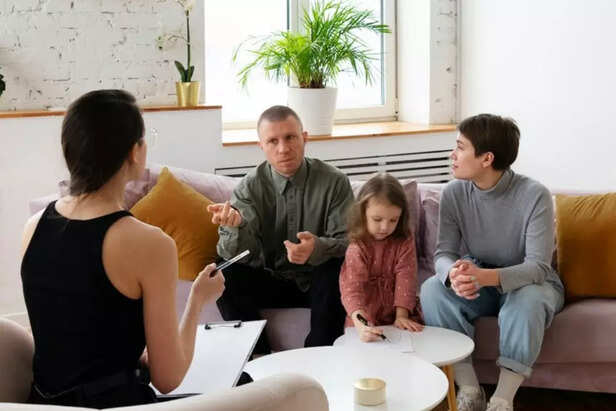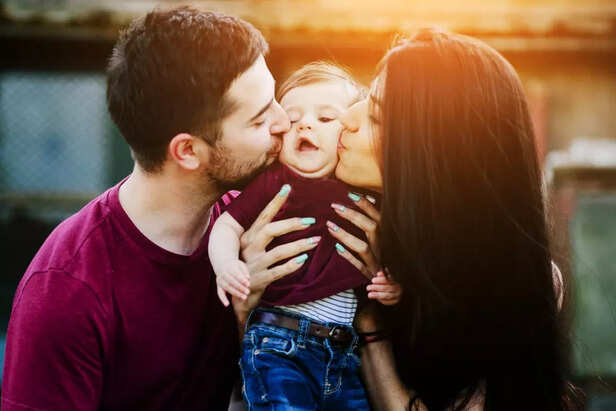Ignoring Your Mental Health? Your Child Might Pay the Price!
Nabila Mulla | Mon, 31 Mar 2025
We all want to give our kids the best, but what if ignoring your own mental health is affecting them more than you realize? Kids absorb everything—from your stress and anxiety to your calm and happiness. This article dives into how your emotional well-being shapes your child's development, subtle signs they may be feeling your struggles, and simple ways to break the cycle. No perfection required—just small, everyday changes that create a healthier, happier home for both you and your little one. Because when you take care of yourself, you’re also taking care of them.

Photo:
Ever notice how kids have a sixth sense for emotions? They can tell when you’re upset, even when you think you’re hiding it well. The truth is, your mental health doesn’t just affect you—it shapes your child’s world too. If you’re running on empty, overwhelmed, or stressed out all the time, your child absorbs that energy.
The good news? You don’t have to be a perfect parent to create a happy, stable home. Taking care of your own mental well-being is one of the best things you can do for your child. Let’s talk about why—and how—you can do it without adding to your stress.
The Hidden Connection Between Your Mental Health and Your Child’s Well-being

Parenting is tough. There’s no manual, and some days feel like an emotional rollercoaster. But one thing is clear: your mental and emotional state directly influences your child’s development.
Think of yourself as a Wi-Fi router. The emotional signals you send out—stress, anxiety, joy, calmness—are like internet signals, and your child is always connected. If your emotional connection is unstable, your child’s world feels shaky, too.
Studies have shown that children of parents struggling with mental health issues are more likely to experience:
The good news? You can break the cycle and create a healthier environment starting today.
The Everyday Signs Your Mental Health Is Affecting Your Child

Think your kids don’t notice when you’re struggling? They do. Children are experts at picking up on energy, even if you don’t say a word.
Here are some ways your mental health might be influencing your child:
1. Mood Swings & Short Temper
When you’re overwhelmed, it’s easy to snap over little things. Your child may start feeling anxious, trying to “keep the peace.”
2. Emotional Distance
You might be physically present but emotionally checked out, leaving your child feeling disconnected.
3. Unpredictability
If your mood changes from one day to the next, your child may struggle with insecurity, not knowing what to expect.
4. Lack of Energy or Motivation
Mental exhaustion can make it hard to engage with your child, leaving them feeling unnoticed.
5. Neglecting Your Own Needs
If kids see their parents constantly exhausted and overwhelmed, they learn that self-care isn’t important—a lesson they carry into adulthood.
6. Difficulty Setting Boundaries
If you struggle to manage your stress or say no to overwhelming responsibilities, your child may not learn how to create healthy boundaries in their own life.
How to Break the Cycle & Create a Healthier Family Environment

You don’t need to be a perfect parent—you just need to be a present, emotionally aware one. Here’s how:
1. Prioritize Your Own Mental Well-Being
Taking care of yourself isn’t selfish—it’s essential.
2. Open Up (in an Age-Appropriate Way)
Your child doesn’t need all the details, but honesty helps.
A peaceful home isn’t problem-free—it just handles stress in a healthy way.
4. Teach Emotional Regulation by Example
Your child learns how to handle emotions by watching you.
5. Encourage Positive Coping Strategies
Help your child develop healthy coping mechanisms by modeling them yourself.
6. Seek Professional Support if Needed
Asking for help isn’t weakness—it’s strength.
The Power of a Healthy Parent-Child Relationship

When parents take care of their mental health, kids benefit in countless ways:
Small, Simple Steps You Can Take Today

Change doesn’t have to be overwhelming. Try these five things today:
You Matter, Too

Taking care of yourself is one of the best things you can do for your child. When you make your mental health a priority, you’re not just helping yourself—you’re creating a home where your child feels safe, loved, and emotionally strong.
So next time you think about pushing your feelings aside, remember: your well-being isn’t just about you. It’s about your family, too. And you deserve to feel good.
Unlock insightful tips and inspiration on personal growth, productivity, and well-being. Stay motivated and updated with the latest at My Life XP.
The good news? You don’t have to be a perfect parent to create a happy, stable home. Taking care of your own mental well-being is one of the best things you can do for your child. Let’s talk about why—and how—you can do it without adding to your stress.
The Hidden Connection Between Your Mental Health and Your Child’s Well-being

Happy Parents, Happy Kids
Parenting is tough. There’s no manual, and some days feel like an emotional rollercoaster. But one thing is clear: your mental and emotional state directly influences your child’s development.
How Does This Happen?
Studies have shown that children of parents struggling with mental health issues are more likely to experience:
- Anxiety and stress – They pick up on household tension and may feel constantly worried.
- Behavioral issues – Mood swings, aggression, or trouble focusing in school.
- Low self-esteem – They might blame themselves for the stress at home.
- Difficulty in relationships – Struggles with trust, communication, and expressing emotions.
- Increased risk of mental health struggles later in life – Children who grow up in emotionally unstable environments may carry similar patterns into adulthood.
The Everyday Signs Your Mental Health Is Affecting Your Child

They Notice Everything
Think your kids don’t notice when you’re struggling? They do. Children are experts at picking up on energy, even if you don’t say a word.
Here are some ways your mental health might be influencing your child:
1. Mood Swings & Short Temper
2. Emotional Distance
3. Unpredictability
4. Lack of Energy or Motivation
5. Neglecting Your Own Needs
6. Difficulty Setting Boundaries
How to Break the Cycle & Create a Healthier Family Environment

Small Changes, Big Impact
You don’t need to be a perfect parent—you just need to be a present, emotionally aware one. Here’s how:
1. Prioritize Your Own Mental Well-Being
- - Do something that helps you recharge, whether it’s a walk, reading, or just five minutes of silence.
- - Learn to say no to things that drain your energy.
- - Let go of the unrealistic expectation of being a perfect parent.
2. Open Up (in an Age-Appropriate Way)
- - Instead of saying, “I’m fine,” try, “I’m feeling a little tired today, but I’ll be okay.”
- - This normalizes emotions and shows kids it’s okay to talk about feelings.
3. Create a Calm Home Atmosphere
- - Keep a simple daily routine to create stability.
- - Spend screen-free time together—whether it’s dinner, a game, or a walk.
- - Use calming activities like music, storytelling, or deep breathing exercises.
4. Teach Emotional Regulation by Example
- - Instead of yelling, try saying, “I need a moment to cool down.”
- - Practice mindfulness or breathing exercises together.
5. Encourage Positive Coping Strategies
- - Show them how to deal with stress in constructive ways—journaling, exercise, creative activities, or talking about their feelings.
- - Avoid using unhealthy habits like excessive screen time, emotional eating, or bottling up emotions.
6. Seek Professional Support if Needed
- - Therapy, counseling, or even a trusted friend can make a big difference.
- - Let your kids see that seeking help is normal and healthy.
The Power of a Healthy Parent-Child Relationship

Strong Bonds, Bright Future
When parents take care of their mental health, kids benefit in countless ways:
- They develop emotional intelligence – They learn to express and manage feelings.
- They build resilience – They understand that tough times don’t last forever.
- They form stronger bonds – A present, engaged parent creates lasting security.
- They grow into confident adults – Watching you take care of yourself teaches them to do the same.
- They feel safe and supported – Knowing they have a stable, emotionally available parent helps kids feel more secure in the world.
Small, Simple Steps You Can Take Today

Start Small, Grow Strong
Change doesn’t have to be overwhelming. Try these five things today:
- Check in with yourself – Ask, “How am I really feeling today?”
- Get fresh air – A short walk can reset your mood.
- Hug your child – Physical connection builds emotional security.
- Laugh together – Watch something funny or tell a silly joke.
- Practice gratitude – Share one good thing about your day before bed.
- Write it down – Keeping a journal of your emotions can help you track patterns and release stress.
- Ask for help – Whether it’s from a friend, partner, or professional, don’t be afraid to reach out.
You Matter, Too

Self-Care Helps Everyone
Taking care of yourself is one of the best things you can do for your child. When you make your mental health a priority, you’re not just helping yourself—you’re creating a home where your child feels safe, loved, and emotionally strong.
So next time you think about pushing your feelings aside, remember: your well-being isn’t just about you. It’s about your family, too. And you deserve to feel good.
Unlock insightful tips and inspiration on personal growth, productivity, and well-being. Stay motivated and updated with the latest at My Life XP.










